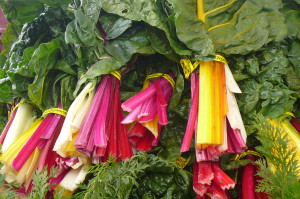Humans should eat a variety of plants and get nutrients from a wide mix of sources. Lots of vegetables contain similar phytonutrient and antioxidant properties, but each will have these nutrients in a unique combination. Chard has a nutrient profile that makes it a powerhouse among veggies.
Chard has about 13 different antioxidants, including a polyphenol called kaempferol, a flavonoid also found in broccoli, kale, and strawberries, known for benefiting the cardiovascular system. But chard also has a flavonoid called syringic acid, which has blood sugar regulating properties, enabling blood sugar to stay more steady. So chard helps with blood sugar control and benefits the entire cardiovascular system.
Chard also has betalains, as do beets. Betalains provide anti-inflammatory and detoxification support. To get the full spectrum of betalains, you would need to eat red beets and golden beets. Chard does the job of both. It’s also an excellent source of vitamins K, A, and C, and provides lots of magnesium, potassium, iron and dietary fiber.

